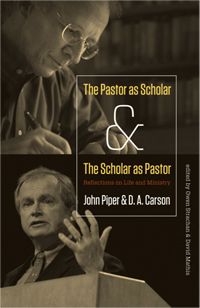
DARREN CRONSHAW on a booklet all about how to successfully combine being a scholar and a pastor…
John Piper and DA Carson
The Pastor As Scholar And The Scholar As Pastor: Reflections On Life And Ministry
Crossway, Wheaton, Illinois, 2011
ISBN-13: 978-1433526473

“(B)eing “scholarly” and reading and explaining the Bible well so that we can know and delight in God is part of the calling of every pastor.”
An unhelpful expectation in theological studies is that the best and brightest theologians will devote themselves to the tasks of scholarship and seminary teaching, rather than apply themselves to pastoral ministry or congregational teaching.
On the other hand, those who devote themselves to congregational ministry as pastors often expect they will have little time for serious scholarship. A misperception underlying these two expectations is that you have to choose one or the other – pastor or scholar? The third alternative, however, is to pursue both scholarship and pastoring, and let each enhance the other.
Some who cultivate this blend will find a local church is their main context for ministry, albeit engaged with the academic world. For example, John Piper was once a college professor, but since 1980 has spent more than three decades as pastor at Bethlehem Baptist Church in Minneapolis.
Others will find their vocation based in the academy, albeit enriched by grassroots pastoral engagement. For example, Don Carson was a pastor, but since 1978 has been research professor of New Testament at Trinity Evangelical Divinity School. Piper and Carson explored the joys and lessons of blending pastoring and scholarship, church and academy, heart and mind at the Carl F H Henry Centre for Theological Understanding at Trinity Evangelical Divinity School, on 23rd April, 2009. This booklet is the result of those lectures.
Owen Strachan introduces the book and puts the conversation in the context of scholar-saints and pastor-theologians who have always been best placed to lead the church. David Mathis concludes by celebrating the trend of younger leaders who do not want scholarly and pastoral roads to diverge. The majority of the book is from the extended talks of Piper and Carson.
John Piper describes his pilgrimage to pastoral ministry, despite fear of public speaking and slow reading habits. A few key school and seminary teachers lit in Piper a love for literature, a tendency to wonder, and a commitment to careful detailed reading of great texts. He diverted from full-time academic work to pastoral leadership, but with a passion to speak “with manifest rooting in the text of Scripture, with clear thinking, with strong feeling, and with imaginative surprise”. This is how “scholarship” informs his ministry and balances head and heart: “that God is most glorified in us when we are most satisfied in him”. Piper neither wants to ignore the mind nor over-intellectualise faith, but help people balance their heads and hearts. He argues that right thinking helps us be aware of and satisfied in God. Right action also helps us live out and understand our faith, a point Piper does not develop. But being “scholarly” and reading and explaining the Bible well so that we can know and delight in God is part of the calling of every pastor.
Don Carson reflects on his call to ministry and finding himself in an academic post, sometimes wondering whether to return to pastoral ministry. He describes himself as “The Scholar as (Frustrated) Pastor”. With a keen interest in the health of local churches, Carson offers a string of helpful advice to other academics. He urges staying engaged with grassroots ministry engagement intellectually, culturally and personally. He warns against being seduced by applause and approval by academia, especially with publishing choices. He bemoans any separation of critical “objective study” of the Bible and “devotional reading”, arguing we need Scripture to master us whether we are reading it for devotions or research. He urges reflective deep reading the best books available and offers practical advice not to be swamped by online busyness and data overload. Carson reminds us to be interested on the work of colleagues and to mentor emerging scholars. And he counsels being aware that students learn from what their teachers are excited about and what they love, and that this has to include a love for the church that Jesus loves:
“Let your students know you love the church; make sure that the fellow members of your church are deeply aware that you love the church, that you love them…such love for the church must find outlets in your prayer life, your priorities, your willingness to participate”.
This is advice from two of the most well-regarded conservative evangelical scholars of their generation. They offer a high view of the roles of pastoring and of scholarship, the spheres of church and the academy, and especially of blending both. Our best and brightest, our wisest and most fruitful scholars and/or pastors need to embrace both grassroots ministry and scholarship, as Piper and Carson epitomise. This is an excellent book for anyone considering whether to pursue scholarship or pastoral ministry, or especially for anyone seeking to hold the two together.
This review was originally published in Colloquium 47:2 (November 2015), 318-219.





